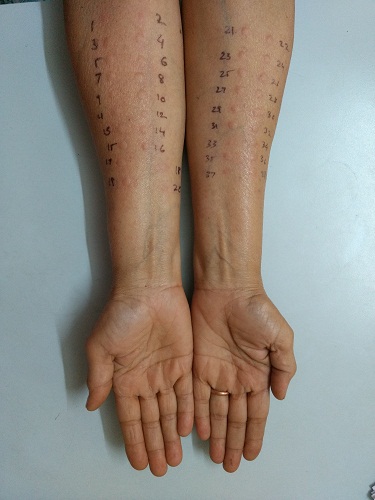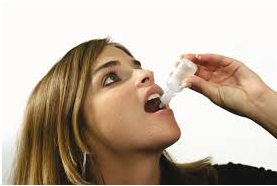Allergy and Immunotherapy:
Allergy is a very common problem and at our hospital we help people understand about this often overlooked problem and provide complete care starting from medication to allergy testing and Immunotherapy as well.
We follow the AAOA- American Academy of Otolaryngologic Allergy guidelines to do the same
At Our Hospital We Perform-
- Skin testing to determine the exact allergy using international standardized allergy extracts
- Sublingual Immunotherapy- Allergy vaccine to alleviate the symptoms of asthma and allergy
What is Allergy?
One of many tasks of the immune system is to protect our body against infectious agents and exogenous toxins. For that it must be able to distinguish between harmless and dangerous exposure. Allergy is defined as an undesirable specific immune response against exogenous substances that have breached the defensive barriers of body like skin,mucous membrane.
The aberrant immune response can lead to a variety of chemical responses that are harmful to the affected individual. Allergic response is often directed against an antigen that can be avoided (while living a normal life).The latest epidemiological studies indicate that 25-30% of population in industrial countries have allergy problem.
Human allergic diseases are:
- Allergic rhinitis 10-15%
- Allergic urticaria 10%
- Allergic asthma 5-10%
- Food allergy is found in 2% of population.

Skin Allergy Testing
Allergens are foreign normally environmental antigens that induce a specific immune response and trigger an allergic reaction. Most antigens are protein or glycopeptides of certain physical characteristics. The tendency for a substance to be more allergic is its ability to penetrate skin or mucosal surface, low molecular weight and good solubility and stability. Inhalational allergens include pollen, molds, animal dander. Ingestional allergens are food and medication that enter body via digestive system.
How do we diagnose Allergies
Allergy testing :Indication to perform this test is if medical treatment has failed. Skin testing is more definitive than blood testing.
How do we treat Allergies
Symptomatic Treatment:
Symptomatic Treatment of nasal allergies is done with the help of
- Medication - Oral medication including anti-histamines
- Nasal washes
- Topical Nasal Sprays - Topical nasal Steroid are used to control symptoms due to allergies
Curative Treatment : Immunotherapy attempts to selectively influence those T&B cells responsible for immune response to a single antigen.
How Does Immunotherapy Work?
Histamine is most important mediator of allergic reaction. Antihistamines or corticosteroids only treat the symptoms of allergic disease. Immunotherapy is only available treatment that can modify the natural course of allergic disease by reducing sensitivity to allergens. A 3 to 5 year individually tailored regimen is designed. Recent research suggests that patients who complete immunotherapy may continue to see benefits for year to come. It does not work for everyone but if offers allergy sufferers a chance to eventually reduce or stop symptomatic medication.
Therapy is not indicated for people who are extremely allergic or who cannot avoid specific allergens e.g. they may not be able to live normal life and completely avoid pollens, dust mite, molds, spores, pets dander, insect venom and other triggers of allergy reaction.

Sublingual Immunotherapy(SLIT)
Immunotherapy is also not indicated for food or medicinal allergy.It is typically individually tailored and admitted by a specialized clinic like ours.It is useful for patients with allergic rhinitis or asthma. It involves sublingual administration of drugs. First vial contains weaker concentration of allergens. Progressively increasing dosages are given over time. Once body adjusts, the allergens become less sensitive and this process is called desensitization. It eventually blocks the culprit antigen with blocking antibody thereby preventing release of histamine.
